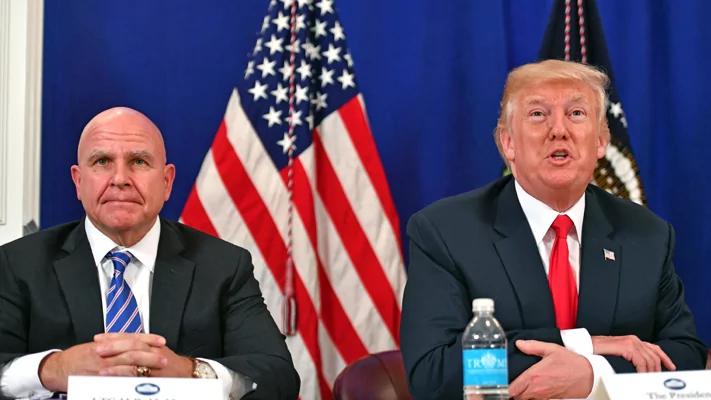Internal conflicts within presidential administrations are nothing new in American history. Indeed, they date to the very beginning of the republic with the very consequential clash between Alexander Hamilton and Thomas Jefferson during the Washington administration. During the Lincoln administration, Secretary of the Treasury Salmon Chase conspired with “Radical Republicans” in Congress to undermine the president’s policies.
Although it never reached the level of the Hamilton-Jefferson debate, it is clear that factional strife within the Trump administration was very acute, a struggle between the pro-Trump advocates of “draining the swamp” and the more conventional Republican establishment. Abraham Lincoln had to maintain a working coalition between War Democrats who wanted to restore the Union and Republicans who saw the war as an opportunity to end slavery. Former President Donald Trump had to keep his own uneasy alliance together.

The internal strife within the Trump administration was exacerbated by social media, competing leaks, and a press always keen to publicize claims most damaging to one party or another. Indeed, the situation within the Trump administration reminds one of a line about the “Chicago way” from the film The Untouchables: “They put one of yours in the hospital, you put one of theirs in the morgue.”
In his new book At War With Ourselves, H.R. McMaster, Trump’s second national security adviser, provides a riveting account of these factional disputes, as well as a portrait of a mercurial president. I believe McMaster, whom I have known for many years, to be the epitome of the apolitical “soldier-scholar,” with excellent credentials to speak truth to power on national security affairs. He is known to be a clear thinker and straight talker. Indeed, McMaster’s intense, fierce outspokenness has not always endeared him to either his peers or superiors.
In the Army, McMaster long ago established a reputation as a highly respected and innovative officer. During the 1991 Gulf War, then-Capt. McMaster commanded Eagle Troop of the 2nd Armored Cavalry Regiment, and during the 1991 engagement known as the Battle of 73 Easting, his cavalry troop overran and destroyed a numerically superior Iraqi Republican Guard force, taking no casualties. For this action, he was awarded the Silver Star.
He later earned a doctorate in history from the University of North Carolina, Chapel Hill, and taught history at the U.S. Military Academy. In June 2004, he assumed command of the 3rd ACR, leading the unit from Fort Carson, Colorado, to Iraq in January 2005 for its second deployment. There he executed a successful counterinsurgency operation in Tal Afar. Later, he led efforts to develop Army doctrine and force structure.
McMaster was well known outside of the Army as well. A true soldier-scholar, he wrote an influential but often misunderstood book, Dereliction of Duty: Lyndon Johnson, Robert McNamara, the Joint Chiefs of Staff, and the Lies That Led to Vietnam, in which he harshly criticized the senior uniformed leadership during the early part of the Vietnam War for failing to present their views concerning the risks of the war frankly and forcefully to their civilian superiors.
From the beginning of his tenure as national security adviser, McMaster was attacked by both opponents and supporters of Trump. The former were those who didn’t want someone of McMaster’s stature helping Trump operate against the interests of the “national security community.” Indeed, Trump’s very election was an affront to this foreign policy/national security consensus and to the people who articulated it: an outsider who did not hesitate to express skepticism about the direction of the foreign and defense policies of his predecessors, arguing against the alleged verities of the post-9/11 consensus as articulated by the national security community. Accordingly, many of Trump’s critics in the national security community argued that McMaster had sacrificed his integrity and “sold his soul” to Trump.
The latter, his enemies in the administration, saw him as part of an establishment that needed to be purged in order to achieve Trump’s goals. The main charge against McMaster was that he was a “globalist,” which I take to mean that he wanted to subordinate U.S. interests to those of an alleged “international community.” But this charge is based on a misunderstanding of what American alliances and support for international institutions are intended to accomplish.

(Nicholas Kamm/AFP/Getty)
American foreign policy since World War II has been based on hegemonic stability theory, which holds that a “liberal world order” does not arise spontaneously as the result of some global “invisible hand.” Instead, such a system requires a “hegemonic power, a state willing and able to provide the world with the collective goods of economic stability and international security.” The United States, as Great Britain before it, took up the role of hegemon not out of altruism but because it was in its national interest to do so.
The idea that has underpinned U.S. foreign policy since World War II is that American power is good not only for the U.S. itself but also for the rest of the world. Yet the desired outcome is motivated not by altruism but by the recognition that the U.S. can be fully secure, free, and prosperous only in a world where everyone else is also secure, free, and prosperous. The mere existence of liberal institutions is not sufficient. A liberal world order is possible only if the U.S. is willing and able to maintain it.
As one can see by reading McMaster’s earlier book, Battlegrounds: The Fight to Defend the Free World, he understood that the sole purposes of American power are, or should be, to secure the American republic, protect its liberty, and facilitate the prosperity of the people. He understood that it is not, or should not be, to create the “global good,” a corporatist globalism divorced from patriotism or national greatness. He understood that the U.S. does not have a moral entitlement to superior power for the “global good.” The U.S. must work constantly at maintaining it. Part of that work is persuading the sovereign American citizen that it is good and right and in his or her interest to maintain that power. A healthy regard for the safety and happiness of citizens requires that U.S. power remain supreme. To reiterate, McMaster understood that the purpose of American power is not to act in the interest of others, such as the “international community,” international institutions, or the like, but in the nation’s interest alone.
Those who study the role of the national security adviser postulate two models: the “honest broker” and the “policy entrepreneur.” The former seeks to bring competing alternative policies to the president. The latter pushes a particular outcome. McMaster acted in accordance with the former: ensuring that the president heard from all parties in order to make informed decisions. Nonetheless, McMaster was also clearly willing to tell the president what he did not want to hear but what he needed to hear. Some of Trump’s supporters may have objected to this advice, but that is what made McMaster a good fit for the position of national security adviser.
In his memoir, McMaster blames much of the friction on the polarization of politics in America as it interacted with the bureaucratic process: “But once he was in office, the forces that [Trump] had exploited to win the presidency interacted with those who despised him and subjected him to constant stress and attack. In the war with ourselves, Donald Trump [became] the antagonist in his own story.”
Regarding political polarization, despite McMaster’s attempt to act as an honest broker, many, such as Steve Bannon and others on the White House staff, saw him as just another operative of the national security community out to undermine Trump’s agenda. In other words, McMaster was part of the problem.
Regarding bureaucratic politics, McMaster was often at odds with Defense Secretary James Mattis and Secretary of State Rex Tillerson, whom, he contends, tried to work around him. Of course, none of this is new. Cabinet officers are, by nature, the bureaucratic enemy of the national security adviser. The former want independence to run their own organizations, and the latter wants to centralize national security decision-making. And in the case of Trump, McMaster had to deal with a mercurial president, who was often distracted by the media and critics. Under such conditions, even simple things could become dysfunctional.
In my view, one of the great accomplishments of the Trump administration for which McMaster deserves a great deal of credit was the 2017 National Security Strategy, which avoided the shortcomings of other examples, including most recently the Biden NSS: that they are long on aspirations and short on a discussion of the means to fulfill these aspirations and that they constitute an exercise in “satisficing” — i.e. accepting the first satisfactory option for all the different bureaucratic and policy interests of the various departments of government and the political factions that make up an administration rather than the optimal one. McMaster also persuaded Trump to develop a coherent South Asia Strategy to replace the years of drift in Afghanistan that had characterized the policy of the Obama administration.
Sadly, although Trump’s character and personality allowed him to make tough decisions, those same traits often prevented him from seeing his policies through. That was true of the NSS and the South Asia Strategy, as well as initially tough approaches to North Korea, Iran, and China. This was based on Trump’s belief that he could “make a deal” with anyone, including authoritarian leaders hostile to the interests of the U.S. McMaster was never able to convince Trump that leaders such as Vladimir Putin and Xi Jinping were uninterested in positive-sum deals.
In retrospect, McMaster noted that Trump had a “conflicted vision,” was “obsessed with critics to the point of distraction” and “vulnerable to manipulation,” and “lacked basic knowledge of how government runs.” In light of McMaster’s study of Lyndon B. Johnson, Robert McNamara, and U.S. military leadership during the Vietnam War in Dereliction of Duty, his discussion of the similarities between Trump and Johnson is intriguing: “As with LBJ, Trump’s insecurities and desire for attention left him perpetually distracted and vulnerable to a mainstream media that was vehemently opposed to him.”
CLICK HERE TO READ MORE FROM THE WASHINGTON EXAMINER
Many reviews of At War With Ourselves have portrayed it as a devastating attack on Trump, but that is an overstatement. McMaster doesn’t hesitate to critique Trump when it is deserved, but he also notes his positive traits and good decisions. Indeed, this has led many to attack McMaster from two directions: Trump supporters who call him an opportunistic traitor and Trump haters who attack him for not denouncing Trump, especially in light of the 2024 elections. I recently followed an X thread on the book launch of At War With Ourselves and was amazed by the snarling invective to which McMaster was subjected. During recent interviews, McMaster steadfastly has refused to denounce Trump, which has especially caused consternation among the Trump haters.
Unfortunately, this response to McMaster’s excellent memoir is just another sad reflection on the hyper-polarization that afflicts the republic today and a commentary on the difficulty of remaining apolitical during such times. As one colleague remarked to McMaster, “In Washington, no one gets to be apolitical. Every national security decision is guided by administration policy and strategy, which means politics.” Under the circumstances, McMaster did better than most.
Dr. Mackubin Owens, a retired Marine and former Naval War College professor, is a senior fellow of the Foreign Policy Research Institute.
